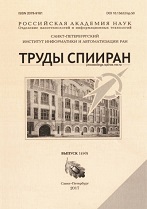|
|
Trudy SPIIRAN, 2009, Issue 11, Pages 130–141
(Mi trspy51)
|
 |
|
 |
The numerical analysis of influence statistical uncertainty on accuracy of trade situation parameters estimation
A. A. Musaevab
a St. Petersburg Institute for Informatics and Automation of RAS
b Public corporation Specialized engineering company "Sevzapmontageautomatica"
Abstract:
Practice of the electronic auctions in the capital markets has shown that statistical characteristics of real processes of quotations evolution significantly differ from the typical mathematical models used in tasks of forecasting and support of decision-making.
There is a research problem of statistical deviations influence on efficiency of formed trading decisions. It is obvious that decisions efficiency, from the capital dynamics technical analysis point of view, will be, in turn, defined by accuracy of current situation estimation and its development forecast reliability.
As the metrics of influence of real economic processes statistical characteristics variations on formed decisions quality it is natural to use change of estimations accuracy. This estimation are used at identification and the forecast of characteristic indicators of the capital markets. Usually as an estimation of accuracy of estimation in practice of the statistical analysis values standard deviations or, in the more general case, a full square of an error are used.
Known ways of struggle against aprioristic statistical uncertainty are in most cases based on some “softening” assumptions, allowing to receive comprehensible decisions for some private problems.
At the same time, practice of the data processing, received in the course of the capital markets monitoring, in view of inertialless observable processes and a great number of influence factors from outside interaction environments, has faced uncertainty of the general view.
Differently proceeding processes, by the nature, are essentially non-ergodic and non-stationary and do not suppose any comfortable for analysts assumptions concerning the nature of the data.
Thereupon for the analysis of the specified uncertainty influence it is necessary to consider set of the data simulating models with various types of statistical characteristics possible variations.
The materials resulted in article allow to confirm a hypothesis that application of data processing traditional schemes (least squares method, maximum likelihood, extrapolation forecast, etc.) in these situations lead to essential decrease in accuracy of forecasting, and, as a result, to decrease in operating decisions efficiency.
At the same time application the adaptive approach focused on current characteristics of process tracking and fine tuning of corresponding prognosis algorithms, is inadmissible on account of inertia-free of information processes describing capital markets dynamics. From here there is immediate conclusion about expediency of
application in similar tasks data processing robust algorithms, possessing statistical stability to the listed above follows non-stationary variations probability characteristics of trading processes.
Keywords:
statistical estimation, forecasting, method of the least squares.
Received: 16.11.2009
Citation:
A. A. Musaev, “The numerical analysis of influence statistical uncertainty on accuracy of trade situation parameters estimation”, Tr. SPIIRAN, 11 (2009), 130–141
Linking options:
https://www.mathnet.ru/eng/trspy51 https://www.mathnet.ru/eng/trspy/v11/p130
|

|




 Contact us:
Contact us: Terms of Use
Terms of Use
 Registration to the website
Registration to the website Logotypes
Logotypes








 Citation in format
Citation in format 